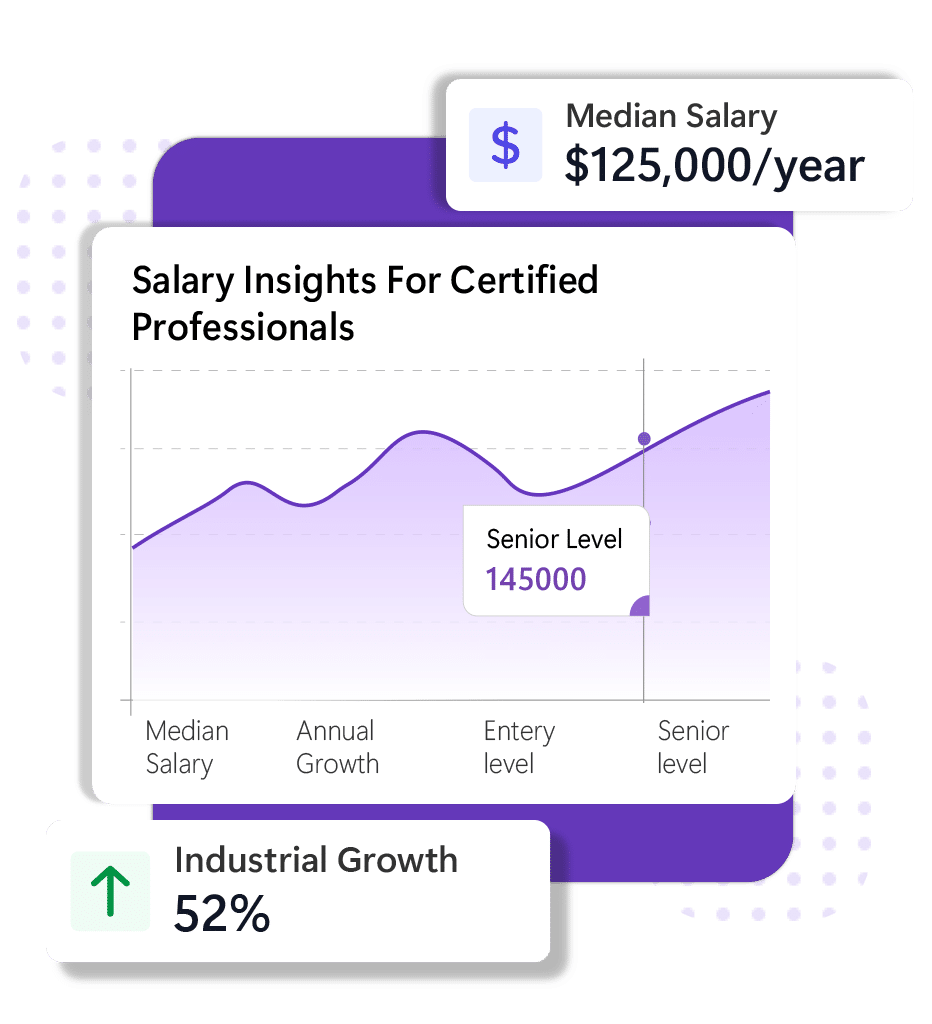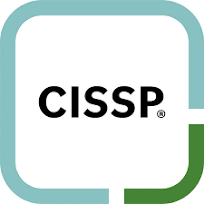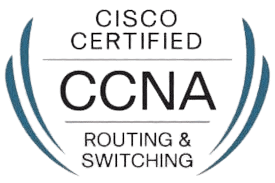Cybersecurity in 2025: Are You Equipped with the Right Certification?
Cybersecurity isn’t just a job anymore—it’s a battlefield. With threats evolving daily, businesses need experts who can keep their systems safe and data secure. But being an expert isn’t enough. You need proof of your skills, and that’s where certifications (or certs, as pros call them) come in. They show employers you’re ready to take on the challenge.
So, why 2025? Because the cybersecurity industry is changing fast. New certs are popping up, and old ones are getting revamped. Choosing the right one this year can make or break your career.


Best For Security consultants, security managers, IT professionals

CISSP - Certified Information Systems Security Professional

4.8 Popularity Score

4.7 User Score

Cloud architects, cloud engineers, DevOps professionals

CISM - Certified Information Systems Manager

4.2 Popularity Score

4.7 User Score

Network administrators, network engineers, IT professionals

ECH - Certified Ethical Hacker

4.2 Popularity Score

4.7 User Score
Table of Contents
EXECUTIVE SUMMARY
| Certification | Details |
|---|---|
CISSP |
|
CISM |
|
CEH |
|
CompTIA Security+ |
|
OSCP |
|
CCSP |
|
GSEC |
|
CASP+ |
|
CRISC |
|
ISC2 CC |
|
You might think it’s just about the cert that’s most popular or expensive. But no, the best certification depends on a mix of factors. It’s not just about what you learn—it’s also about how that knowledge translates into real-world skills and career boosts.
Certifications that focus on practical experience are winning the game. Employers want people who can solve problems, not just pass tests. And don’t forget global recognition; a cert isn’t much help if only a handful of companies know what it is.
Our Criteria for selection:
Our criteria for selecting these certifications as “THE BEST CYBERSECURITY CERTS,” was based on the following parameters:
Relevance and Industry Demand:
Certifications were chosen based on their alignment with current and future cybersecurity needs across industries, such as cloud security, risk management, and ethical hacking.Career Impact:
Focused on certifications that open doors to key roles (e.g., Security Analyst, CISO) and offer high ROI through competitive salaries and global recognition.Skill Development:
Prioritized certs that provide a mix of hands-on practical skills and theoretical knowledge, ensuring real-world applicability.Accessibility and Growth Potential:
Considered the certifications’ cost, difficulty, and career progression opportunities, making them suitable for beginners to advanced professionals.
1. CISSP: Why It’s the Boss of Cybersecurity Certs
The CISSP cert, short for Certified Information Systems Security Professional, isn’t just a name; it’s like a badge of honor in the security industry. If you’re serious about making it big in cybersecurity, this is the one you’ll keep hearing about.
Who’s Behind It?
What’s the Exam Like?
Who’s It For?
Who’s It For?
Why Do People Love It?
- Money Talks: Starting salaries hover around $90K and can hit $200K+ for senior roles.
- Industry Love: Banks, hospitals, tech giants—they all want CISSP pros.
- Global Stamp: Over 140 countries recognize it, so you can work almost anywhere.
What’s It Gonna Cost You?
How Hard Is It?
What’s the ROI?
2. CISM: The Cybersecurity Manager’s Go-To Cert
CISM: The Cybersecurity Manager’s Go-To Cert
Ever wonder how companies figure out what to protect and how? That’s where CISM comes in. It’s short for Certified Information Security Manager and focuses on the business side of cybersecurity.
Why Does It Matter?
CISM is all about making sure the tech stuff aligns with business goals. It’s for people who don’t just want to secure systems but also want to manage teams and make big-picture decisions.
Who Issues It?
ISACA, a global heavyweight known for its focus on IT governance and risk management. If you’ve worked in IT, you’ve probably run into their frameworks before.
What’s the Exam About?
Expect 150 multiple-choice questions in 4 hours. It’s split into areas like risk management and incident response—stuff you’ll actually use in the real world.
Who Should Go for It?
This one’s for mid-level to senior pros, especially if you’re aiming to become a manager. You’ll need five years of security experience, with three in a management role.
What’s the Buzz About It?
- Demand: Banks, governments, and healthcare orgs love this cert.
- Salary: Think $85K for starters, climbing to $150K+ in senior roles.
- Relevance: Perfect for industries drowning in regulations, like finance and healthcare.
What’s the Cost?
You’re looking at $575–$760 for the exam, depending on whether you join ISACA. Then there are the prep materials, which can easily add another $1,000.
How’s the Difficulty?
Moderate, but it leans more on concepts and less on technical nitty-gritty. Pass rates are better than CISSP, though, which is good news for your nerves.
Why It’s Worth It
For anyone looking to climb the management ladder, CISM delivers. You’ll learn stuff that makes you indispensable to big organizations.
3. CEH: For Those Who Think Like Hackers
Ever thought about hacking into systems—but legally? That’s what CEH, or Certified Ethical Hacker, is all about. It teaches you to think like the bad guys so you can stop them in their tracks.
Who’s Behind It?
The EC-Council runs this cert, and they’ve been in the hacking game for years. They’re all about ethical hacking and penetration testing, making CEH one of their flagship offerings.
What’s in the Exam?
You get 125 multiple-choice questions in 4 hours. Topics? Everything from scanning networks to sniffing data and even cracking passwords.
Who’s It For?
If you’re just starting in ethical hacking or pen testing, this is your gateway. It’s also great for IT pros looking to pivot into security.
Skills You’ll Learn:
- Using tools like Metasploit, Nmap, and Wireshark.
- Spotting vulnerabilities before attackers do.
- Understanding social engineering and malware tactics.
What Jobs Can You Get?
- Penetration Tester
- Vulnerability Analyst
- Security Consultant
Why Is It Popular?
- Demand: As cyberattacks rise, ethical hackers are more important than ever.
- Salary Potential: Beginners make around $70K, but seasoned pros can hit six figures.
- Relevance: Companies across industries (from banks to e-commerce) need ethical hackers to safeguard their systems.
How Much Does It Cost?
The exam costs about $1,199, and you’ll probably want to spend another $1,500–$2,500 on training programs.
How Hard Is It?
It’s moderately tough. If you’ve got IT experience, you’ll do fine with 4–6 months of study and plenty of hands-on practice.
ROI at a Glance:
CEH is a solid entry-level cert, but it’s not the endgame. Most pros eventually stack it with advanced certs like OSCP or CISSP for bigger career moves.
Practical vs. Theoretical Focus:
It’s a mix. You’ll get some hands-on experience, but it’s not as intense as OSCP in terms of practical testing.
Networking & Community Perks:
EC-Council has a big ethical hacking community, with forums, webinars, and even hacking competitions to keep you sharp.
4. CompTIA Security+: A Beginner’s Best Friend
If cybersecurity feels like uncharted waters, CompTIA Security+ is your life raft. It’s the go-to cert for anyone starting out, covering the basics without overwhelming you.
Who Runs It?
CompTIA, a non-profit group, offers Security+ and a ton of other IT certs. Their stuff is well-respected and vendor-neutral, so you’re not tied to any specific tech.
What’s in the Test?
Expect 90 questions in 90 minutes. It’s a mix of multiple-choice and performance-based tasks, covering everything from threats and vulnerabilities to basic cryptography.
Who Should Take It?
It’s made for beginners. If you’ve got a bit of IT background but no security experience, this is your perfect starting point.
Skills You’ll Pick Up:
- Identifying and mitigating security risks.
- Configuring basic security controls.
- Understanding key protocols like TLS and SSL.
What Jobs Can You Land?
- Security Analyst
- IT Support Specialist
- Network Administrator
Why Is It Worth It?
- Accessibility: No prerequisites make it easy to jump into.
- Cost-Friendly: At $392 for the exam, it’s a steal compared to advanced certs.
- Industry Use: Many entry-level security jobs list Security+ as a must-have.
How Hard Is It?
It’s beginner-friendly but not a cakewalk. Plan for at least 6–8 weeks of study, especially if you’re new to IT security.
ROI in Simple Terms:
For under $400, you get a cert that opens the door to cybersecurity. It’s not the most lucrative cert, but it’s a great first step.
Global Recognition:
It’s accepted worldwide, especially in government roles (like DoD in the U.S.).
Practical vs. Theoretical Mix:
Security+ leans more on the theoretical side, but its performance-based questions give you a taste of real-world problem-solving.
5. OSCP: The Hardcore Hacker Badge
If you want a cert that proves you can actually hack systems (legally, of course), OSCP is it. Short for Offensive Security Certified Professional, this one’s not for the faint of heart.
Who’s Behind It?
Offensive Security, the same folks who created the famous Kali Linux, run this program. Their focus? Hands-on, no-nonsense hacking skills.
What’s the Test Like?
Forget multiple-choice questions. OSCP’s exam is a 24-hour hacking marathon where you have to break into live systems and submit a detailed report.
Who Should Go For It?
If you’re serious about penetration testing or want to prove your skills to employers, this cert is a game-changer.
Skills You’ll Master:
- Exploiting vulnerabilities and escalating privileges.
- Writing custom exploits.
- Using tools like Burp Suite and Metasploit.
Career Opportunities:
- Penetration Tester
- Red Team Specialist
- Security Engineer
Why It’s Respected:
- Hands-On: There’s no room for fluff—it’s all practical.
- Salary Boost: OSCP-certified pros often earn $90K–$120K a year.
- Industry Love: Companies hiring pen testers know OSCP is the real deal.
Cost Breakdown:
The exam and lab access start at $1,499, but it’s worth every penny if you’re serious about hacking.
How Hard Is It?
It’s brutal. Many candidates fail on their first try, but that’s part of its charm. You’ll need months of prep and lots of lab time.
ROI in a Nutshell:
OSCP might cost a lot upfront, but the career benefits make it one of the best investments for hackers.
Practical vs. Theoretical Focus:
It’s 100% hands-on, so if you’re tired of book learning, this is your cert.
Community Perks:
Offensive Security’s forums and alumni network are filled with some of the best minds in cybersecurity.
6. CCSP: Your Ticket to Cloud Security Mastery
Cloud computing is taking over, and so are the risks that come with it. Enter CCSP, short for Certified Cloud Security Professional. This cert focuses entirely on making cloud environments safe and secure.
Who Runs the Show?
ISC2, the same folks behind CISSP, offer CCSP. They’re big on certs that blend security knowledge with leadership skills, so CCSP comes with a solid reputation.
What’s the Exam Like?
The CCSP test runs 4 hours and has 125 multiple-choice questions. It dives into six domains, including cloud architecture, data security, and risk management.
Who Should Go for It?
It’s perfect for people already working in IT or security who want to specialize in the cloud. If you’ve handled AWS, Azure, or GCP environments, CCSP takes that knowledge to the next level.
Skills You’ll Gain:
- Architecting secure cloud infrastructures.
- Managing data privacy and compliance in the cloud.
- Incident response for cloud-specific threats.
Job Roles This Cert Unlocks:
- Cloud Security Architect
- Cloud Engineer
- Security Consultant
Why It’s in Demand:
With businesses moving everything from data to apps into the cloud, CCSP-certified pros are becoming indispensable. Industries like fintech, healthcare, and SaaS are especially hungry for this skill set.
How Much Will It Cost?
The exam fee is $599, but that doesn’t include prep materials or training, which can range from $500–$2,000.
How Tough Is It?
It’s not as brutal as OSCP or CISSP, but it’s no walk in the park either. Most people spend 3–5 months prepping.
The ROI You’ll Get:
CCSP-certified pros earn between $90K and $140K a year, depending on experience and location. Plus, it positions you as a specialist in a rapidly growing field.
Global Recognition:
CCSP is accepted worldwide, especially in regions like North America, Europe, and Asia where cloud adoption is massive.
Practical vs. Theoretical Focus:
It’s a healthy mix. You’ll get some hands-on elements alongside theoretical knowledge, making it ideal for both managers and techies.
7. CCSP: Your Ticket to Cloud Security Mastery
GSEC: The Security All-Rounder
If you’re looking for a cert that blends theory and practice, GIAC Security Essentials Certification (GSEC) might just be your best bet. It’s great for those transitioning from IT to security or anyone who wants to solidify their foundational skills.
Who’s Behind It?
GIAC, or the Global Information Assurance Certification group, offers GSEC. Their certs are respected for being both rigorous and practical, making them a favorite in cybersecurity circles.
What’s the Exam Like?
You’ll face 180 questions over 5 hours. Unlike some other certs, GSEC tests your hands-on knowledge as much as your book smarts.
Who Should Consider It?
This one’s for IT pros making a shift into security or those at the junior-to-mid level looking to strengthen their skills.
What You’ll Learn:
- Securing networks and operating systems.
- Implementing cryptographic solutions.
- Handling active defenses against cyber threats.
What Careers Can It Boost?
- System Administrator
- Network Security Analyst
- Security Operations Center (SOC) Analyst
Why People Like It:
- Practical Focus: You don’t just memorize stuff—you actually learn how to apply it.
- Relevance: Covers a broad range of topics, making it versatile across industries.
- Demand: Particularly valued in IT-heavy sectors like telecom and government.
What’s the Cost?
The exam fee is steep at $2,499, but it includes two practice exams and study materials.
How Hard Is It?
It’s challenging but manageable. Most candidates prep for 2–4 months, especially if they’re already familiar with IT basics.
ROI in Simple Terms:
It’s pricey upfront, but GSEC opens doors to mid-level security roles with salaries ranging from $80K to $120K.
Global Recognition:
While it’s not as universally known as CISSP, GSEC is gaining traction worldwide, especially in North America.
Hands-On vs. Book Learning:
Heavily hands-on, which is why IT pros love it. It’s one of the few certs that actually teaches you how to secure a live system.
8. CASP+: CompTIA’s Underrated Gem
If you’re an experienced pro but don’t want to go full management mode (like with CISSP), CASP+ (CompTIA Advanced Security Practitioner) might be what you’re looking for. It’s tech-heavy and focuses on advanced cybersecurity problem-solving.
Who’s Behind It?
CompTIA, known for their beginner-friendly certs, also has CASP+, which is aimed at senior-level professionals.
What’s in the Exam?
This 90-question exam combines performance-based and multiple-choice questions. Expect topics like enterprise security, cryptography, and risk management.
Who Should Take It?
If you’ve been in the field for at least 5 years and want to stay technical (rather than move into management), CASP+ is your cert.
What Skills Will You Build?
- Designing secure enterprise networks.
- Analyzing complex risk scenarios.
- Implementing cryptographic techniques for real-world problems.
What Jobs Does It Lead To?
- Senior Security Engineer
- SOC Lead Analyst
- Enterprise Security Architect
Why It’s Noteworthy:
- Demand: Not as popular as CISSP, but growing rapidly in tech-heavy industries.
- Cost-Friendly: At $494, it’s one of the cheapest advanced-level certs out there.
- Tech Focus: Keeps you hands-on, which many senior pros prefer.
How Tough Is It?
It’s harder than Security+ but easier than CISSP. Most candidates prep for 3–5 months, especially if they’re already working in security.
ROI in a Nutshell:
Great value for the cost, especially if you want to stay technical while earning salaries between $100K and $140K.
Global Appeal:
While it’s more recognized in North America, its reputation is growing internationally.
Practical Focus:
CASP+ leans heavily on hands-on problem-solving, making it a favorite among tech geeks.
9. CRISC: The Risk Pro’s Certification
In a world where cybersecurity risks can make or break businesses, CRISC (Certified in Risk and Information Systems Control) comes in strong. This cert is all about managing risk and aligning IT goals with business needs.
Who’s Running It?
CRISC is offered by ISACA, the same organization behind CISM. They’re big on risk management and governance, and CRISC reflects that focus perfectly.
What’s the Exam Like?
The CRISC exam has 150 multiple-choice questions, covering four key domains: Risk Identification, Risk Assessment, Risk Response, and Risk Monitoring. You get 4 hours to complete it.
Who Should Go For It?
If you’re already in a risk management or IT governance role, or if you’re an IT pro looking to transition into those fields, CRISC is ideal.
What Skills Do You Gain?
- Mastering risk identification and analysis.
- Creating risk mitigation strategies that align with business objectives.
- Implementing controls to monitor and manage IT risks.
What Jobs Does It Open Doors To?
- Risk Analyst
- IT Auditor
- Cybersecurity Manager
Why Is It Popular?
- Industry Need: Every organization needs pros who understand both risk and IT.
- Salaries: CRISC-certified pros can earn between $100K and $146K annually.
- Demand: High in industries like finance, healthcare, and manufacturing, where risk management is critical.
What Does It Cost?
The exam costs $575 for ISACA members and $760 for non-members. Like other ISACA certs, you’ll also need to spend on prep materials and annual maintenance fees.
How Hard Is It?
Moderate. CRISC focuses on management concepts rather than technical skills, making it less intimidating than CISSP but still challenging.
What’s the ROI?
CRISC is one of the highest-paying certs in the risk management space. It’s an excellent investment if your career leans toward governance and compliance.
Global Reach:
It’s recognized in heavily regulated regions like the U.S. and Europe, but it’s growing in demand globally as risk management becomes a priority.
Hands-On or Conceptual?
CRISC is more theoretical, focusing on policy and business alignment rather than hands-on tech skills.
10. ISC2 Certified in Cybersecurity (CC): A Simple Start for Beginners
ISC2 Certified in Cybersecurity (CC): A Simple Start for Beginners
The ISC2 Certified in Cybersecurity (CC) certification is perfect for anyone trying to break into the field. It’s a beginner-friendly cert that proves you have the fundamental knowledge needed to start your cybersecurity journey.
Who Offers It?
ISC2, the organization behind heavyweights like CISSP and CCSP, launched the CC certification as a way to bring more people into cybersecurity. Think of it as the “entry ticket” to this fast-growing industry.
What’s the Exam Like?
The CC exam isn’t too intimidating, especially for those new to the field. Here’s the breakdown:
- Format: Multiple-choice questions (online, proctored).
- Number of Questions: 100.
- Duration: 2 hours.
- Domains Covered: Five areas, including Security Principles, Network Security, and Risk Management.
Who’s It For?
If you’re starting from scratch or transitioning from another IT role, this is the perfect cert. No prior experience is required, making it accessible to students, career changers, or IT pros looking to specialize in cybersecurity.
What Skills Do You Gain?
- Understanding basic security concepts like confidentiality, integrity, and availability.
- Recognizing common threats like phishing and malware.
- Learning foundational principles of access controls and network security.
What Careers Can It Lead To?
While it’s an entry-level cert, ISC2 CC can get your foot in the door for roles like:
- Cybersecurity Analyst (Junior Level).
- IT Support Technician with a security focus.
- Network Security Assistant.
Why It’s Worth It in 2025
- Demand: Cybersecurity is booming, and employers are willing to hire candidates with even basic skills.
- Relevance: It covers the foundational topics you’ll use every day in entry-level roles.
- Global Appeal: ISC2 is a respected name, so having their cert on your resume carries weight.
What Does It Cost?
The exam is budget-friendly at $199, which is far cheaper than other ISC2 certifications. Plus, ISC2 offers free access to their online self-paced course for the CC cert, making it even more affordable for beginners.
How Hard Is It?
It’s manageable, especially if you’re willing to dedicate 4–6 weeks to studying. With ISC2’s free course and other online resources, you can build the knowledge you need without breaking a sweat.
ROI You Can Expect:
This cert isn’t going to land you six figures right away, but it can open doors to entry-level jobs that pay $50K–$70K annually. Once you get some experience, you can move on to more advanced certs like CISSP or CCSP for bigger career boosts.
Global Recognition:
Since ISC2 certs are recognized worldwide, having the CC on your resume can help you find opportunities in nearly any region.
Hands-On or Theoretical?
The CC is mostly theoretical, focusing on knowledge rather than practical skills. It’s meant to give you the groundwork you need before diving into hands-on certifications.
Community Perks:
Once you earn your ISC2 CC, you become an associate member of ISC2, gaining access to forums, resources, and a network of cybersecurity professionals.
Is It the Right Cert for You?
If you’re just starting in cybersecurity or looking for a cert to validate your basic knowledge, the ISC2 CC is a smart choice. It’s affordable, beginner-friendly, and backed by a name you can trust in the cybersecurity world.

